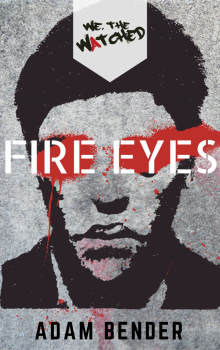- Home
- Adam Bender
The Wanderer and the New West Page 2
The Wanderer and the New West Read online
Page 2
The doorbell chimed. Rosa cursed. The real world had once more invaded her solitude. She was sitting in her home office, originally the second bedroom. It was a one-story rancher, which meant that she could get to the door in seconds, but she didn’t want to get up. Instead, she held her typing position, willing whoever was at the door to go away.
The visitor pounded. The reporter glanced at a small pot of dying basil on the windowsill. She visualized the words she’d spent hours cultivating wither away like the brown leaves of the herb.
“Hey, c’mon, Rosie! Open up!”
It was Jackson. Still, she hesitated …
“It’s for The New West!”
That got her. She popped up from her chair and sprinted to the door. “What do you have?” she asked her brother, adding a hug as if an afterthought.
With a sly smile, he bounced past her into the ranch house and onto her sofa. He was still wearing his church clothes: a short-sleeved button-down and an ill-fitting pair of blue slacks. Even though he was now a father in his thirties — not to mention a lawyer, for God’s sake — Jackson still looked as uncomfortable in nice clothes as he had when he’d been younger. Then there was his black mane. Even tied back into a ponytail, it was longer than her own shoulder-length haircut. Combined with the round glasses on his face, he was starting to look a lot like a hippy.
“How comes the writing of the great journalist, Rosa Veras?” he asked.
He was the only other person who knew about The New West. For some reason, she was deathly afraid of people finding out she was writing it, so she had been posting anonymously. It wasn’t that she feared controversy. The whole point was to get away from the cut-and-paste journalism of her peers. But there was her day job to think about. She worked remotely for Our Times, the national newspaper based in Vegas. It was owned by Breck Ammunition, and as a result didn’t actually publish much in the way of real news, at least not the kind of hard-hitting stuff that she wanted to write. But while she might not enjoy producing fluff pieces, that’s where the money was, and she had to make a living somehow.
“I was on a roll until you showed up,” she told Jack. “You shouldn’t lie about having a lead —”
“There was a shooting at church!” he blurted.
Rosa stared wide-eyed at her brother. He looked okay — almost pleased. Sweeping a stack of takeout menus off the wooden coffee table by his knees, she picked up her tablet and created a new page in her notebook. “Are you all right? Tell me everything.”
As he told her about the Wanderer and the confrontation with Tom Jenkins, Rosa began to picture a tall drink of water with a sombrero, stirrups, and a big silver gun. She checked the description with her brother.
“Not a sombrero,” Jack corrected. “What’s the hat the white cowboys always wear in the movies?”
“A Stetson?”
“Isn’t that like a shoe?”
“No, stupid, that’s a stiletto.”
He seemed to think on that. “Stetson. Sure, maybe. Oh, and he had a glass over one eye — might’ve been AR!”
She raised her eyebrows. Augmented reality seemed like pretty expensive tech for your average gunman. Clearly, this Wanderer guy had found his way into some money. Maybe he’d held up a stagecoach.
“What’s so funny?”
“Nothing,” she said. “Wait, hold on, Jack. How were you close enough to see his eyes?”
Her brother eyed his shoes. It was an expression of guilt that he used to wear for their parents after forgetting to do his chores. “When everybody started running out of the building, the Wanderer was trapped. So, I … stopped to let him out.”
Rosa blinked in disbelief. “Wait, you helped the gunman? After what happened to —?” She covered her mouth, but the wounded look on his face showed the damage had been done. She rushed forward to hug him. “I’m sorry, Jack, but … that was dangerous! I just … don’t want to lose you, too.”
He smiled weakly. “I know. It was just … there was something different about the Wanderer. He didn’t just burst into the church shooting. He told everyone why he was there, who he had come for, and he didn’t even take out his gun until Jenkins started firing. He held steady even after Ben Martin got all riled up! I mean, Jesus, anyone else would have shot that fat bastard.”
She breathed thoughtfully. “Ben means well.”
Jack rolled his eyes. He’d had a grudge against Ben Martin since they were kids and the sheriff came to arrest their father. Dad went to state prison with a life sentence, and they hadn’t seen him in years. Their father was a passionate sports gambler who’d lost his head after losing a bet on the Super Bowl. A fistfight ended in a gun duel. He’d won the standoff, but lost everything else.
Rosa had come to believe her dad deserved the sentence, but Jack never doubted his innocence, always insisting that there had to be more to the story. She guessed that was a big reason that her brother began to practice law. The irony, of course, was that the very crime their father was imprisoned for had become commonplace in America. It just wasn’t the kind of thing for which people got in trouble anymore. At the same time, there was no movement to retroactively exonerate the incarcerated.
After Dad went to prison, their mom tried to raise them on her own. But she soon turned to the bottle for company. Ben Martin began stopping by every few days to check in on them, usually with a greasy bag full of hamburgers and fries clutched between his fingers. He wasn’t very good with kids, and Rosa assumed he was coming by mostly out of guilt. Jack resented him, but she’d always given him credit for trying.
“Look, Jack, I know how you feel about Martin, but why would you take the side of a lawless man? Aren’t you supposed to be an attorney?”
The glass of Jack’s circular frames magnified his eyes. “Yeah, that’s right. A defense attorney.”
She raised her eyebrows. “And here I thought Jenkins was the accused.”
A little red entered his cheeks as he grinned. “Hey, can’t a lawyer choose his cases?”
She laughed and turned to her tablet, tapping the stylus against the glass of the device as she read her notes. Rosa could swear she had talked to Tom Jenkins once for a story in Our Times, but for the life of her couldn’t remember what it was about. Baseball, maybe? She knew he was still in high school. Rosa recalled slightly more about the Hellers, having written a piece earlier in the year about student council elections. Sharon was class president. Sara was popular, too, but only because she was blonde and bland.
Rosa asked, “So did this Wanderer say where he planned to wander next?”
“No, but if he’s smart, he’ll leave Liberty. Didn’t see a car …”
She bit her lip to keep from laughing. “Maybe he had a horse?”
“Steady!” he replied with a grin. “Seriously, though, I bet he was headed for the train. But that was an hour ago — he’s probably long gone.”
*
The doorbell of the mayor’s mansion responded to Martin’s touch with the opening notes to “You’re a Grand Old Flag.” After a few thumps of his foot against the floorboards of the great white porch, he paced away from the west-facing entrance and looked out at the desert. The arid view offered a harsh contrast to Mayor Alex White’s lush lawn.
The door clicked open — Martin swiveled around to face a butler in a dark brown suit. He had an arch to his gray eyebrows that gave him a look of permanent surprise. “Sheriff? To what do we owe the pleasure?”
“I need to see the mayor. Now.”
“The mayor is engaged in a state legislature meeting, but if you don’t mind waiting—”
“No, now. Tell him it’s important.”
Martin remembered a time when a mayor would have nothing to do with the state legislature. But that was before White and his ilk got voted into local, state, and federal offices around the country. The Born-Again Patriots’ platforms against Big Government had turned into a large-scale consolidation making many traditional political positions redundant. In W
hite’s home state of Arizona, the group had eliminated traditional state lawmakers, giving mayors the additional responsibility of casting votes on the legislature.
The butler beckoned the sheriff inside and went to inquire after his employer. Martin removed his Army hat and tapped it against his thigh. His matted gray hair glistened with sweat as he gaped at the large entrance area. The floor was pure white tile with a crystal chandelier hanging from the ceiling. Thomas Jefferson hung smugly on one wall, while a war scene with muskets was carried out on the other.
“Nice foy-er,” muttered Martin, pronouncing the word like a true American. He pulled a flask from inside his police jacket and had a quick swig of whiskey.
The butler called from upstairs, “The mayor will see you now.”
At first, Martin took the steps two at a time, but soon, he began to wheeze and had to slow down. After a long slog, he made it to the top and followed the butler into a large study.
“Sheriff!” exclaimed Mayor White with a youthful enthusiasm that belied his shiny bald head. Congenially, he slapped the policeman on the back.
Martin looked past the mayor to a webcam and large TV on the opposite wall. The screen displayed a woman in a suit giving a speech, bordered by a rectangle of interested faces — other members of the state legislature, he assumed. Martin watched the bright red lips of the lady rep move but couldn’t hear what she was saying. A bright green MUTE in the bottom-right corner explained why.
“I didn’t mean to interrupt,” apologized the sheriff, shuffling sideways to avoid the webcam’s blank gaze.
Apparently befuddled by this behavior, White turned to see what Martin was looking at. “Oh! Don’t worry about that gal. I have the microphone off. I don’t have to speak for another thirty minutes or so.”
“But can’t they see … ?”
The politician grinned broadly. “That’s the clever part! Keep this under your hat, but a few weeks ago I recorded a video of myself listening attentively. It loops every five minutes. You know, these meetings are such a bore — I just had to do it.”
Martin wasn’t sure how to respond.
“What? I’m not the only one, believe you me!” White pointed to one of the static faces on the border of the screen and began to circle his finger around the screen. “Fake … fake … fake … mmm, not sure, but probably fake … fake …”
Martin did believe him. Ignorance and arrogance seemed to be the way of all these Born-Again Patriots who’d let the law slip away in America. All talk and no listening — not even to each other. When they’d finished overhauling states and localities, the Born-Again Patriots had eliminated the entire national government, including the president, congress, and federal court system. All power moved to the states, and, for the most part, they now acted independently from one another. To maintain some small level of coordination, governors occasionally held conferences in the neutral territory of Washington, D.C., but this was mostly for appearances. It had been a long time since anyone referred to America as the United States.
Mayor White fell back into his chair and waved the sheriff to sit down on the other side of the desk. “So, what’s new? Oh! Actually, I’m glad you’re here. You see, I’ve been meaning to have a word with you. A few of the constituents have reported seeing you going in and out of the old police station. You’re not still living there, are you?”
Martin gaped in response. He had explained this to the mayor several times before, but it was like talking to a brick wall. After White slashed the law enforcement budget five years ago, Martin had been forced to close the station and lay off his entire police force. Ben held on to his title of sheriff — someone had to — but they expected him to work from home with a reduced salary. The problem was he didn’t have a home anymore, not since the missus had kicked him out.
Not that he really expected White to understand. These damn Born-Again Patriots had come almost entirely from the private sector — guns, oil, telecommunications, and so on — and once they took over the government, the first thing the businessmen did was lay off everyone. All of a sudden, there didn’t seem to be any public money left for anything, even law enforcement. The new politicians argued that the private sector could provide security. If you couldn’t afford to hire someone, you could get a gun and protect yourself.
Martin felt a catch in his throat as he replied. “The station is all I have left.”
The mayor’s bald head twisted reproachfully. The movement reminded Martin of a vulture. “Now, Ben, you’re a town hero and everyone appreciates what you did at that Walmart, but you can’t just —”
“Mayor, another lunatic showed up at my church today! He shot a boy!”
White sarcastically gasped, “Good God! Was he justified?”
Martin scowled. “Justified? That’s not the point!”
“I don’t follow.”
“We can’t have this kind of lawlessness! I’m supposed to be sheriff, but things have gotten to the point where I can’t do anything about vigilante craziness like this.”
The confusion on the mayor’s face remained. “Why bring this to me?”
Martin could feel his temperature rising. “Because men like you make the laws.”
The politician hooted. “Ben, Ben, Ben … the government hasn’t made laws for years! Now, if there’s some sort of burdensome regulation getting in the way of what you’re trying to do, maybe I can help, but —”
“Goddammit! I’m supposed to be enforcing the laws! I am enforcing the laws, except there’s barely any goddamned laws to enforce anymore! Well, I’ll tell you this, Mayor, I am not going to be reduced to just another vigilante! You hear me? I am the sheriff of the fucking police!”
The mayor turned the color of his name. “There’s … there’s no need for profanity. I think you should leave. You need to cool off for a while. Have a few more beers, perhaps.”
Martin ignored the dig at his drinking and persisted. “But this man, the Wanderer … he’s still out there, probably killing more innocents!”
“Is he still in Liberty?”
“Well, no, I don’t think so, but …”
“Well, then, he’s not your problem, is he?”
Martin looked past him to one of the room’s east-facing windows. The blinds were closed, but the sheriff knew it was the town of Liberty upon which the mayor had turned his back.
White exhaled with resignation. “Look, if you really want him dead, put a prize on his head. I know a guy.”
“You mean a bounty hunter,” he growled. “You’re asking the sheriff of police to hire a bounty hunter.”
The politician walked to his desk and scrawled a phone number on a yellow Post-it. When Martin rejected it, White insisted. “If you want this Wanderer gone, it’s the best way. Trust me.”
Ben Martin snatched the piece of paper and stormed off.
*
Rosa’s Ford pickup kicked up a cloud of red dust as it stammered into the parking lot of Liberty Station. The door squealed in agony when she pushed it open, but she ignored it. She had bought the truck fresh-rusted from Jack years ago. The train station wasn’t much to look at, either — just a trailer with white siding and a permanent boot over one wheel. Red sand stained the group of plastic chairs scattered around front. They looked relieved to be empty.
She cursed. There was no sign of the Wanderer. Trains didn’t come through Liberty many times each day, and she’d hoped against hope he’d still be waiting.
Rosa jogged up to the trailer window used for ticket sales. Steve, the old station manager, continued to work on a crossword puzzle as she read a flyer taped up to the glass. It featured the boy half of a young couple’s selfie, and there were tear-offs at the bottom with phone numbers.
Wanted, preferably dead:
John Hanson
$5,000 award! Call Jessica for more info.
Rosa groaned at the misuse of the word award. It should have said reward.
“How long ago did the train leave?” she a
sked Steve.
“Where did you come from?” gasped the station manager, noticing her for the first time.
She laughed. “Sorry, Steve.”
He closed his eyes. At first, it seemed like he was in deep thought, but Rosa soon began to worry the old man had fallen asleep. She was about to wake him when his eyes snapped back open. “I’d say the train left at about quarter of eleven.”
It was almost noon according to her watch, a cheap plastic number in hot pink. Jack had given it to her as a gag gift a few months ago after she declared her intention to become a “real reporter” and write The New West. He’d joked real reporters wore watches to secretly record conversations for investigative pieces. But rather than pay for an expensive model, he’d bought her a kid’s toy — something that cheap parents could give to children who wanted the real thing but didn’t know any better. It had a flimsy band and told the time on a standard gray LCD screen. The watch’s only “smart” feature was a built-in digital recorder, which she’d never bothered to use since her tablet had one and recorded higher quality audio. Jack had never really intended for her to wear it, and, in fact, he’d begged her to take it off. So she wore it anyway, out of spite.
“Sorry, Steve — I have something to ask you.”
Steve had been working at the station ever since he retired from his old job as a train conductor. She didn’t really understand it. Why would someone who had been on the move his entire life choose to stop at Liberty of all places?
“Where you headed today, my dear?” he asked, turning to his monitor.
“What? Oh, nowhere.”
Steve laughed. “You’re the second person to ask for a ticket there. Let’s see, maybe I can give you a few options?”
Rosa waved at the ticket seller to get his attention away from the screen. “No, I don’t want a ticket at all. I’m actually writing an article and was hoping to, um, to ask you a few questions.”
Steve’s eyes brightened. “I’m going to be in Our Times? Fantastic! How can I help?”
Steve was too sweet for lies. “Oh, well, it’s not actually for Our Times, but it’s still important. I just need to know if you sold a ticket, maybe about an hour or two ago, to a man that looked a bit like a cowboy from the movies? You know … Stetson hat, couple of guns, that kind of thing?”

 Invasion Day
Invasion Day Fire Eyes
Fire Eyes Life Trade
Life Trade The Wanderer and the New West
The Wanderer and the New West Divided We Fall
Divided We Fall